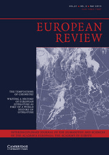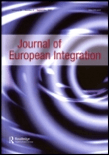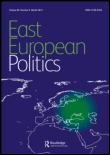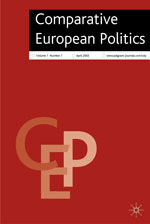
Romanian Journal of European Affairs
Scope & Guideline
Exploring the dynamics of European integration and policy.
Introduction
Aims and Scopes
- European Integration and Governance:
The journal extensively covers topics related to the processes and challenges of European integration, including governance frameworks, policy analysis, and the role of institutions in shaping EU dynamics. - Geopolitical and Geoeconomic Studies:
A significant focus is placed on the geopolitical implications of EU policies, particularly in relation to major global players like the USA and China, as well as regional dynamics in Eastern Europe and the Balkans. - Sustainability and Climate Policy:
The journal contributes to discussions on sustainability, particularly through the lens of the EU’s climate policies, circular economy initiatives, and the impacts of climate change on socio-economic structures. - Digital Diplomacy and Cybersecurity:
With the rise of technology in international relations, the journal explores the implications of digital diplomacy, cybersecurity threats, and their intersection with traditional foreign policy. - Social and Economic Development in Eastern Europe:
The journal addresses the socio-economic development issues faced by Eastern European countries, examining aspects such as governance quality, economic resilience, and social rights.
Trending and Emerging
- Geopolitical Implications of Climate Change:
Recent publications emphasize the intersection of climate change with geopolitical strategies, particularly in relation to energy policies and sustainability in Europe. - Digital Transformation in International Relations:
There is an increasing focus on how digital tools and technologies are reshaping diplomacy, with studies examining the impact of digital diplomacy and cybersecurity on foreign policy. - Post-Pandemic Governance and Economic Recovery:
The journal is increasingly publishing analyses on the implications of the COVID-19 pandemic for governance structures, economic resilience, and recovery policies in EU member states. - Regional Security Dynamics in Eastern Europe:
Emerging themes address regional security issues, particularly the impacts of the Russian-Ukrainian conflict on local governance and security frameworks in Eastern European countries. - Gender Perspectives in EU Relations:
A rising interest in gender analysis within EU relations, particularly regarding membership and cooperation with neighboring states, indicates a growing recognition of gender as a critical lens in European studies.
Declining or Waning
- Traditional Foreign Policy Mechanisms:
There has been a noticeable decline in papers focused solely on traditional foreign policy frameworks, possibly overshadowed by the emergence of digital diplomacy and cybersecurity themes. - Historical Analysis of EU Policies:
Research that primarily concentrates on historical perspectives of EU policies appears to be waning, as contemporary issues and immediate challenges take precedence in the journal's discourse. - Migration Issues Pre-2015:
The focus on migration issues, particularly those related to the pre-2015 context, has seen a decline, with more recent analyses shifting towards post-2015 migration crises and their implications for EU borders. - Economic Analysis of EU Member States:
While economic analysis remains important, there seems to be a reduction in studies focusing on broad economic comparisons among EU member states, with a shift towards more specific case studies. - Cultural Diplomacy:
The exploration of cultural diplomacy as a distinct theme is becoming less prevalent, as the journal gravitates towards more pressing economic and security issues.
Similar Journals

TalTech Journal of European Studies
Empowering academic inquiry in the heart of Europe.TalTech Journal of European Studies, published by SCIENDO, is a distinguished Open Access journal dedicated to advancing the fields of History, Law, Political Science, and Sociology. Since its inception in 2013, this journal has become a crucial platform for scholarly discourse, catering to an international audience interested in the complexities of European studies. Registered under ISSN 2674-4600 and E-ISSN 2674-4619, the journal is peer-reviewed and aims to disseminate high-impact research findings that drive forward academic inquiry and practical applications within its diverse scopes. With a notable classification in the Q4 quartile across various categories, including History, Law, and Political Science, it holds its ground against global standards, evidenced by its Scopus rankings. The journal not only supports the academic community by offering a platform for innovative research but also strengthens collaborative efforts to address contemporary challenges in European contexts. The accessibility of its content makes it a vital resource for researchers, professionals, and students seeking comprehensive insights into European affairs.

European Review
Advancing Knowledge Across DisciplinesThe European Review, published by Cambridge University Press, serves as a vital platform for scholarly discourse in the fields of Geography, Planning and Development as well as Political Science and International Relations. Since its inception in 1993, this journal has contributed significantly to the academic community, providing a comprehensive review of pivotal issues and emerging trends across Europe and beyond. With an impressive H-Index and ranking in the Q3 category for both Geography and Political Science as of 2023, the European Review is highly regarded among researchers and practitioners interested in interdisciplinary methodologies and innovative research approaches. Although it is not an open-access publication, it offers subscribers access to a wealth of meticulously peer-reviewed articles, making it indispensable for those striving to keep abreast of the latest developments in these dynamic fields. The journal's commitment to fostering knowledge exchange ensures its importance as a resource for students, professionals, and researchers alike.

Croatian Yearbook of European Law & Policy
Championing Scholarly Exchange on European Legal IssuesCroatian Yearbook of European Law & Policy, published by the University of Zagreb, Faculty of Law, stands as a vital resource in the realm of European legal studies and policymaking. This open-access journal, operational since 2005, provides a platform for scholarly discourse and is dedicated to the exploration of contemporary European legal issues, fostering a deeper understanding of law and policy across the continent. With its ISSN 1845-5662 and its designation as Q4 in the law category for 2023, the journal engages a diverse audience, including researchers, professionals, and students, while holding a significant Scopus ranking of Rank #623/1025 within the social sciences law domain, placing it in the 39th percentile. Located in Zagreb, Croatia, the journal not only contributes to the academic landscape but also enriches the practical applications of European law and policy, making it an indispensable tool for those engaged in this dynamic field.

European Law Review
Illuminating Human Rights and Legal Comparisons in EuropeEuropean Law Review is a prominent academic journal dedicated to the comprehensive analysis and critical exploration of European legal issues. Published by SWEET MAXWELL LTD in the United Kingdom, this journal serves as a vital platform for scholarly discourse within the field, holding a commendable Q2 ranking in the Law category as of 2023. The journal's articles encompass a range of topics, including European Union law, human rights, and comparative legal studies, appealing to researchers, professionals, and students alike. With an H-index that reflects its academic influence and a solid Scopus ranking in the social sciences, the European Law Review remains an essential resource for those engaged in legal research and practice. While it is not an open-access journal, it offers rich, peer-reviewed content aimed at advancing knowledge and understanding of European law dynamics from 1995 to the present day.

Studia Europejskie-Studies in European Affairs
Navigating the Landscape of European AffairsStudia Europejskie - Studies in European Affairs, published by the esteemed University of Warsaw Centre for Europe, is an acclaimed peer-reviewed open access journal that has been dedicated to the exploration and critical analysis of European affairs since its inception in 1997. With its ISSN 1428-149X and E-ISSN 2719-3780, this journal serves as a pivotal platform for scholars, researchers, and practitioners who aim to deepen their understanding of European integration, policies, and sociocultural dynamics. The journal plays a significant role in disseminating high-quality research that fosters dialogue and knowledge exchange within the European studies community and beyond. By providing unrestricted access to its content, Studia Europejskie ensures that valuable insights into pressing European issues reach a wide audience, promoting informed debate and academic collaboration. Join a vibrant scholarly community by contributing to and engaging with the latest research on European affairs.

Journal of European Integration
Decoding the Fabric of European Political StructuresJournal of European Integration is a leading academic journal dedicated to the study of European politics and the dynamics of European integration. Published by Routledge Journals, part of the esteemed Taylor & Francis Ltd, this journal has established itself as a premier outlet for high-quality research, reflected in its Q1 category rankings in both Political Science and International Relations, as well as in Sociology. With a robust publication history spanning from 1977 to 2024, it offers vital insights into the complexities of political structures and societal impacts within Europe. Notably, it ranks in the 95th percentile in Political Science and International Relations and the 92nd percentile in Sociology, presenting a significant platform for scholars and practitioners alike. Although it does not currently offer Open Access options, the journal's comprehensive content serves as an essential resource for those engaged in understanding contemporary European issues and policy debates. Researchers, professionals, and students will find the Journal of European Integration to be an indispensable source of knowledge and academic discourse.

East European Politics
Navigating the Complexities of East European AffairsEast European Politics, published by ROUTLEDGE JOURNALS, TAYLOR & FRANCIS LTD, is a premier academic journal that plays a pivotal role in advancing the understanding of the socio-political dynamics within East Europe. Established in 2012 and spanning through 2024, this journal is renowned for its rigorous scholarship, achieving a distinguished Q1 ranking in key categories including Development, Geography, Planning and Development, and Political Science and International Relations for 2023. With an impressive Scopus rank placing it in the top 5% within the fields of Political Science and International Relations, East European Politics serves as an essential resource for researchers, professionals, and students seeking to engage with contemporary political issues and development challenges in the region. The journal does not offer open access at this time, but maintains a rich archive of high-quality articles that contribute significantly to scholarly discourse and policy analysis. This vital platform not only disseminates current research but also fosters a deeper understanding of the historical and cultural contexts that shape the political landscapes of East Europe.

Comparative European Politics
Shaping the Future of Political Science in EuropeComparative European Politics is a leading academic journal dedicated to the nuanced exploration of political systems, policies, and behaviors across Europe. Published by Palgrave Macmillan Ltd, this esteemed journal has carved out a significant niche in the study of Political Science and International Relations, holding a prestigious Q1 ranking in its field as of 2023. The journal is recognized for its rigorous peer-reviewed articles that contribute to the advancement of knowledge and understanding in the discipline, making it an essential resource for scholars, practitioners, and students alike. With an impressive Scopus rank placing it in the 82nd percentile among its peers, Comparative European Politics provides a platform for innovative research and critical discussions, ultimately aiming to shape policymaking and theoretical frameworks across Europe. While currently not an open-access journal, it continues to offer various access options to ensure its findings are disseminated widely, further amplifying its impact on contemporary political discourse.

OSTEUROPA
Navigating the Social Fabric of Eastern EuropeOSTEUROPA is a distinguished academic journal dedicated to the examination and analysis of social, cultural, and political developments in Eastern Europe. Published by BWV-BERLINER WISSENSCHAFTS-VERLAG GMBH, this journal has been a critical voice in the field since its inception in the mid-20th century, notably converging from various years to establish a comprehensive discourse on the dynamics shaping the region. With an ISSN of 0030-6428 and an E-ISSN of 2509-3444, OSTEUROPA taps into the expansive fields of sociology and political science, holding a reputable Q3 category ranking in these disciplines for 2023. While not currently an open access publication, it remains a vital platform for researchers, professionals, and students alike who seek to deepen their understanding of Eastern European affairs. The journal also ranks in the 17th percentile within the Scopus listings, underscoring its role as a significant, albeit niche, contributor to social studies and political science scholarship. Addressed from its base in vibrant Berlin, OSTEUROPA continues to foster intellectual dialogue and provide valuable insights into the complexities of Eastern European societies.

European Security
Elevating Understanding of Contemporary Security ChallengesEuropean Security is a leading interdisciplinary journal published by ROUTLEDGE JOURNALS, TAYLOR & FRANCIS LTD, dedicated to advancing the understanding of security issues within the realms of Political Science and International Relations. With an impressive Impact Factor and a Q1 ranking in its field as of 2023, this journal has solidified its position as an influential platform for scholars and practitioners alike, ranking #93 out of 706 in the Scopus database. Since its inception in 1992, European Security has provided a forum for original research, analytical essays, and review articles that explore the complexities of security, conflict, and cooperation in the European context and beyond. The journal's commitment to high-quality scholarship is reflected in its rigorous peer-review process and the diverse perspectives it fosters. Although offering subscription-based access, the content within is invaluable for anyone engaged in the study of contemporary security challenges. Whether you are a researcher, professional, or student, European Security is essential reading for deepening your understanding of the dynamic and evolving landscape of international security.